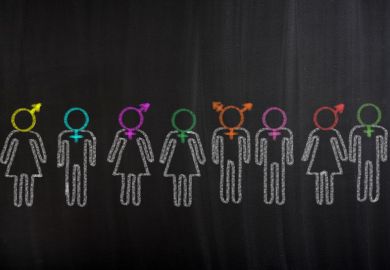Academics have expressed anxiety about the ultimate reach of the Trump administration’s move to deny personal choice in gender identification, although sector leaders appear determined to defend their stance on the issue.
The proposed policy, described in a memo obtained by The New York Times, would assign every individual a gender of either male or female, based on genitals at birth, with no option to legally change that, in the latest Trump pushback against an Obama administration policy that left such identification as a matter of personal choice.
Depending on its intended scope, the memo could be symbolic; it could foretell limits on funding for student activities; or it could mean reopening contentious debates over the right to choose appropriate toilets and changing rooms.
“There are a lot of questions yet to be answered” while awaiting clarification of the memo by the administration, said Z Nicolazzo, an assistant professor of trans* studies in education at the University of Arizona. “But there certainly is potential for various negative influences, beyond the dog-whistle politics that is certainly at play here.”
One of the most significant manifestations of the question on US university campuses came in 2016, when the state of North Carolina enacted legislation requiring the choice of bathroom in many public buildings to correspond to each user’s sex at birth. The bill led to confusion and protests at universities and beyond, before the state replaced the bill in 2017.
If the administration does not try to force states to take a similar position, most US universities will continue to grant transgender students the right of choice on such matters, several experts said.
That was demonstrated last year, they said, when the Trump administration rescinded an Obama administration guidance letter advising colleges that a failure to grant transgender students their choice of facilities would be considered an illegal form of sex-based discrimination.
Few colleges responded to the Trump move by denying transgender students their right of choice, said Natasha Baker, an attorney at Hirschfeld Kraemer, who specialises in higher education. “Unless they’re politically required to, I don't think we’ll see a lot of schools walking away from this,” she said.
Instead, said Genny Beemyn, director of the Stonewall Centre at the University of Massachusetts at Amherst, many US colleges “are moving away from a gender binary and becoming more gender-expansive”.
The Trump administration has not made clear how aggressively it intends to fight that trend. An administration push in that direction, while unlikely, “would have a fairly significant impact on higher education”, said another lawyer with a higher education practice, Scott Schneider of Husch Blackwell.
Beyond bathrooms, the administration memo could signal plans to attempt banning financial support for academic services geared toward transgender students, Dr Nicolazzo said. Either way, just the sentiment of the administration’s memo and the uncertainty around it is raising the threat level felt by transgender students, said Susan Stryker, an associate professor of gender and women’s studies at the University of Arizona.
“The sowing of confusion, the announcement of policies with no details, the haze of whether or not policies are being implemented” are already a problem, Dr Stryker said. “Contradiction, obfuscation, uncertainty – they are the very tactics of the attack.”
Register to continue
Why register?
- Registration is free and only takes a moment
- Once registered, you can read 3 articles a month
- Sign up for our newsletter
Subscribe
Or subscribe for unlimited access to:
- Unlimited access to news, views, insights & reviews
- Digital editions
- Digital access to THE’s university and college rankings analysis
Already registered or a current subscriber?







